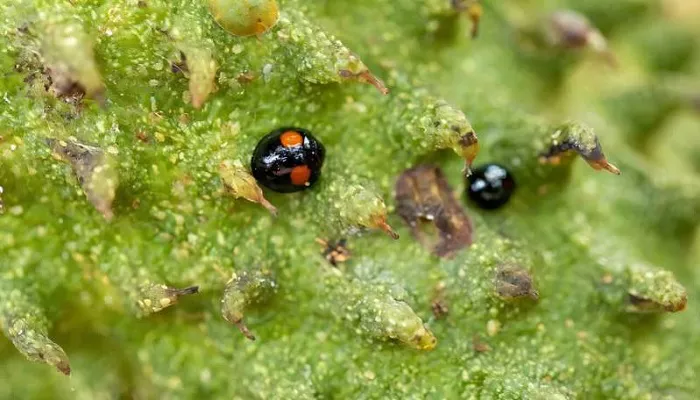GRENADA — The soursop fruit, long cherished by Grenadians for its rich flavor and central role in local desserts like ice cream, is being safeguarded thanks to an unlikely hero: the ladybird beetle.
For farmers like Laurel Williams, soursop isn’t just a crop — it’s a symbol of cultural identity and culinary pride. “I have this real affection for soursop,” she says. “For me, it’s ice cream.” Beyond its use in treats like smoothies, cakes, and teas, soursop is Grenada’s top agricultural export, generating $2.6 million annually according to the UN Food and Agriculture Organization.
But that success has come under threat from a fast-spreading pest known as the croton scale — a sap-sucking insect that damages crops by weakening plants and encouraging the growth of a destructive black fungus called sooty mold. First detected in Florida in 2008, the pest has since reached several Caribbean islands and was confirmed in Grenada in 2020.
Small-scale farmers such as Ryan Hall and Noreen Francique have seen hundreds of trees affected, resulting in reduced harvests and rejected produce due to visible damage. “I was wondering if it’s going to take over the farm and destroy it,” Hall recalls.
Initial responses included chemical pesticides and natural oils like neem, which temporarily reduced infestations. However, reinfestations soon followed due to the pest’s rapid reproduction cycle. “We always knew we had to get into biological control,” said Thaddeaus Peters, Grenada’s Chief Agricultural Officer.
Enter the ladybird beetle. Once deployed in the 1990s to combat the pink hibiscus mealybug, the beetle is now proving equally effective against croton scale. Working alongside agricultural scientists from the research organization CABI, Grenada’s Ministry of Agriculture has identified and distributed the beetle and other natural predators like parasitic wasps across farms.
This shift to biological control reduces dependency on chemical sprays and provides a sustainable way to manage pests. “We don’t want to destroy what is working for us,” said pest management officer Francis Noel. Farmers are also being trained to identify beneficial species and monitor pest populations, improving their long-term resilience.
The program has brought more than pest control; it has restored hope to farmers whose livelihoods hinge on the health of their crops. Williams says, “Whenever I see something I’m not familiar with, I call them immediately.”
Efforts are now underway to create a Caribbean Invasive Species Trust Fund, aimed at providing sustainable funding to support pest control programs, maintain monitoring systems, and protect regional biodiversity.
As Grenada continues to nurture its soursop industry, these biological interventions are proving essential — not only for farmers, but for those seeking to explore future ice cream franchise opportunities and capitalize on the latest ice cream trends rooted in authentic, local ingredients.
Related topics
- Cricket Meets Confectionery: Havmor’s Choco Vanilla Cricket Ball Ice Cream and Nationwide Fan Challenge
- Honeycomb Ice Cream Guide: Origins, Brands & Irresistible Flavor
- From Finance to Franchise: How One Woman Found Her Calling with Bruster’s Real Ice Cream


